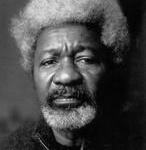Biography

Wole Soyinka was born into a Yoruba family in Abeokuta, specifically, a Remo family from Isara-Remo on July 13, 1934. He is a Nigerian writer, poet and playwright. He was awarded the 1986 Nobel Prize in Literature, where he was recognised as a man "who in a wide cultural perspective and with poetic overtones fashions the drama of existence", and became the first African to be so honoured. In 1994, he was designated UNESCO (United Nations Educational, Scientific and Cultural Organization) Goodwill Ambassador for the promotion of African culture, human rights, freedom of expression, media and communication.
His father was Christian Clergy, Canon SA Soyinka. He received a primary school education in Abeokuta and attended secondary school at Government College, Ibadan. He then studied at the University College, Ibadan (1952–1954) where he founded the pyrates confraternity (an anti-corruption and justice seeking student organization) and the University of Leeds (1954–1957) from which he received a First class honours degree in English Literature. He worked as a play reader at the Royal Court Theatre in London before returning to Nigeria to study African drama. He taught in the Universities of Lagos, Ibadan, and Ife (now Obafemi Awolowo University, Ile-Ife). He became a Professor of Comparative Literature at the then University of Ife in 1975. He is currently an Emeritus Professor at the same university.
Soyinka has played an active role in Nigeria's political history. In 1965, he made a broadcast demanding the cancellation of the rigged Western Nigeria Regional Elections following his seizure of the Western Nigeria Broadcasting Service studio. He was arrested, arraigned but freed on a technicality by Justice Esho. In 1967, during the Nigerian Civil War he was arrested by the Federal Government of General Yakubu Gowon and put in solitary confinement for his attempts at brokering a peace between the warring Nigerian and Biafran parties. While in prison he wrote poetry on tissue paper which was published in a collection titled Poems from Prison. He was released 22 months later after international attention was drawn to his unwarranted imprisonment. His experiences in prison are recounted in his book The Man Died: Prison Notes of Wole Soyinka (1972).
He has been an implacable, consistent and outspoken critic of many Nigerian military dictators, and of political tyrannies worldwide, including the Mugabe regime in Zimbabwe. A great deal of his writing has been concerned with "the oppressive boot and the irrelevance of the colour of the foot that wears it". This activism has often exposed him to great personal risk, most notable during the government of General Sani Abacha (1993–1998), which pronounced a death sentence on him "in absentia". During Abacha's regime, Soyinka escaped from Nigeria via the "Nadeco Route" on motorcycle. While abroad, he visited parliaments and conferred with world leaders to impose a regime of sanctions against the brutal Abacha regime. These actions and his setting up of the Radio Kudirat helped immensely in securing Nigeria's return to civilian democratic governance. Living abroad, mainly in the United States, he was a professor at Emory University in Atlanta. When civilian rule returned in 1999, Soyinka returned to a hero's welcome back in Lagos, Nigeria. He accepted an Emeritus Professorship at Ife (now Obafemi Awolowo University) on the condition that the university bar all former military officers from the position of chancellor. Soyinka is currently the Elias Ghanem Professor of Creative Writing at the English department of the University of Nevada, Las Vegas and the President's Marymount Institute Professor in Residence at Loyola Marymount University in Los Angeles, California, US.
Novels
* The Interpreters
* Season of Anomie
Memoirs
* The Man Died: Prison Notes
* Aké: The Years of Childhood
* Isara: A Voyage around Essay
* Ibadan: The Penkelemes Years: a memoir 1946-65
* You Must Set Forth at Dawn
Poetry collections
* A Big Airplane Crashed Into The Earth (original title Poems from Prison)
* Idanre and other poems
* Mandela's Earth and other poems
* Ogun Abibiman
* Samarkand and Other Markets I Have Known
* Abiku
* The Ballad of the Landlord
* After the Deluge
* Prisonnettes
* Telephone Conversation
Essays
* Neo-Tarzanism: The Poetics of Pseudo-Transition
* Art, Dialogue, and Outrage: Essays on Literature and Culture
* Myth, Literature and the African World
* From Drama and the African World View
* The Burden of Memory - The Muse of Forgiveness
* The Credo of Being and Nothingness



